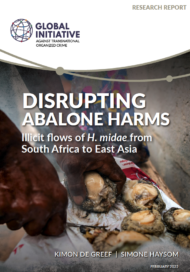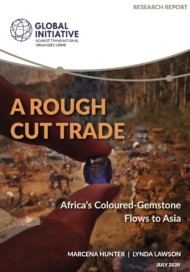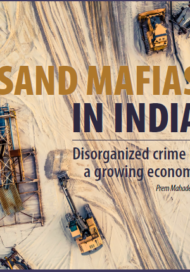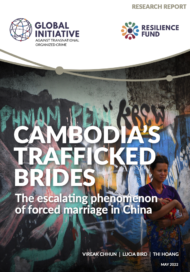Posted on 25 Jul 2022
COVID-19 travel restrictions decimated the tourism industry worldwide. In South East Asia’s popular casino hubs, the sharp drop in visitor numbers, especially gamblers from China and Thailand, has fostered an alarming new organized crime phenomenon – modern slavery in cyber-fraud schemes.
In numerous sites across Cambodia, it is estimated that tens of thousands of people, primarily from the Mekong region, but also India and Ukraine, are reportedly being held against their will and forced to operate sophisticated cyber scams. Exploited workers say they are imprisoned in complexes by Chinese criminal groups, who torture those who try to escape.
Most of Cambodia’s 150 casinos are Chinese-owned and based in Sihanoukville, with several others located on the borders with Vietnam and Thailand, and one mega-casino complex in Phnom Penh. These cater primarily for the Chinese and, to a lesser extent, Thai and Vietnamese tourism markets, as gambling is illegal in China, Thailand and Vietnam. Alongside casino gambling, Sihanoukville was also home to a flourishing (legal) online gambling industry until 2019, when China persuaded Cambodia to outlaw online gambling.
As a result of the ban and COVID-19-related travel restrictions, many legally registered casinos were compelled to close; others sought new income streams, including illegal online gambling as well as scam investment operations. Most of these activities take place either on, or close to, the premises of the casino complexes, and are allegedly orchestrated by Chinese organized crime groups, which take advantage of Cambodia’s fast internet connection and lax law enforcement.
Interviews conducted across Thailand, Cambodia and Laos with rescue workers and survivors of human trafficking found that the scam operations usually involve workers responding to advertisements for high-paying jobs in online trading. Victims are then typically locked into initial six-month job contracts and told they have accrued thousands of dollars in costs, trapping them in debt bondage. These debts continue to accrue if they fail to reach their impossibly high targets. They are given a fake social media identity and a list of individuals (‘marks’) whom they must trick into making an investment, such as in cryptocurrency or gold. Akin to a Ponzi scheme, some operators deliver a sizeable return on an initial, modest investment, winning trust of these marks before luring them into investing a much larger sum. Once their money is taken, the operation cuts all contact with the duped marks, leaving them unable to recover their investment.
Although this scam industry seems to have first emerged in Sihanoukville, the same model appears to have been replicated elsewhere in the region. Almost identical patterns have been reported by victims working in casinos in Laos and Myanmar.
Responses
Over the past two years, NGOs, journalists, police officers and senior government authorities have raised the alarm on the scale of human trafficking and modern slavery detected in these scam operations. Victims allege having been subjected to forced labour, confinement, violent assault, sexual exploitation and being used as ‘blood slaves’, where their blood is allegedly taken and sold.
However, as accounts given by survivors have become increasingly extreme, Cambodian authorities appear to have doubled down – only not on the alleged perpetrators, but on those making the claims. Some who have spoken out have been arrested for spreading fake news.
Frustrated with Cambodian inaction, Thai authorities have been known to dispatch their own police force to rescue indentured workers. In April 2022, Thai police conducted incursion raids on locations in Phnom Penh and Sihanoukville, accompanied by local police, hoping to rescue up to 3 000 Thais believed to have been tricked into working for scam operators; they managed to rescue just 66. Thai authorities have also asked for support from Laos officials to retrieve their nationals from casinos in Laos, but the response appears to have been inadequate.
A handful of trafficking victims have managed to make pleas for help directly to the authorities and helplines. In Cambodia, one victim posted a comment on the prime minister’s Facebook live streams, leading to a rescue operation. And some locations have been raided by Cambodian police. Despite these responses, the sites in question have not been shut down.
As the crisis has attracted more attention, civil society actors working to help trafficking victims have themselves become targets of arrest. Chen Baorong is a Chinese businessman based in Sihanoukville and head of the Cambodia–China Charity, an organization that rescues and repatriates Chinese victims of trafficking. In February 2022, Chen helped one escapee, Li Ya Yuan Lun, who claimed he had been kidnapped and sold to a gang that harvested his blood. Although the doctors who treated Li corroborated his claim, police in Sihanoukville insist that stories of blood extraction and organ harvesting are faked so that victims can avoid prosecution for other crimes, such as illegally entering the country.
After public outcry in China prompted the Chinese embassy in Phnom Penh to request an investigation into Li’s case, Cambodian authorities maintained that the story was fabricated and Sihanoukville police charged Li with incitement to discriminate and false declaration. They also arrested three others as accomplices: Chen, Chen’s assistant and a doctor who treated Li. All four are currently in pre-trial detention and the Cambodia–China Charity’s WeChat account has been blocked since 4 March, shutting off the helpline for trafficking victims.
The casino tourism industry in South East Asia is still a long way from recovery, as Chinese international tourism has been reduced a fraction of what it was before the pandemic. But with borders having generally reopened, trafficking victims in Cambodia are entering the country on tourist visas to work in these illegal operations. Now that travel is easier, it is likely that the industry will continue to grow.
Recommendations
Our research has found that efforts to shut down online scam centres and rescue trafficked workers are severely hindered by the collusion of local authorities, or at the very least an unwillingness to enter special economic zones (SEZs) and guarded casino complexes perceived to be outside the jurisdiction of the host country’s security ambit.
Clarification is required urgently on the legal right of sovereign nations like Laos and Cambodia to access and police all parts of their territory and enforce national laws, as well on strengthening of police powers to issue and enforce search warrants on sites suspected of large-scale criminal activity and holding workers against their will.
In July, the US government downgraded Cambodia to Tier 3, the lowest rating, in its Counter Trafficking in Persons Report 2022, highlighting Cambodian government inaction and endemic corruption relating to online scam operations as part of its rationale. The potential damage on the country’s reputation, and the impact this will have on donor funding, may persuade authorities to investigate these incidents seriously. Investors and INGOs operating in Cambodia and Laos are well placed to maintain pressure on these governments to crack down on scam operations as a prerequisite for ongoing funding.
Finally, far more work needs to be done by CSOs to educate young people at risk of trafficking, especially on the social media platforms through which they are recruited. While Thailand has made efforts in this regard, this is a regional problem that exploits vulnerable people. More cohesive, early interventions are severely needed.



